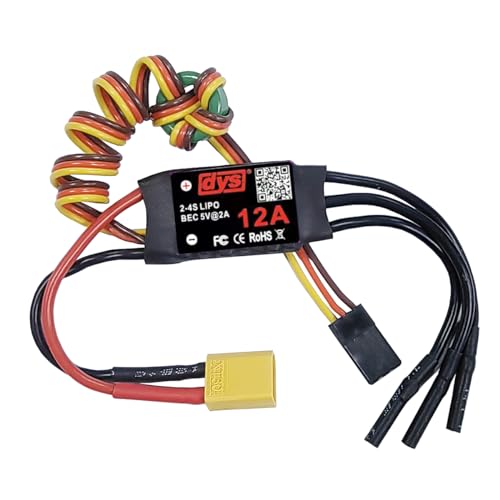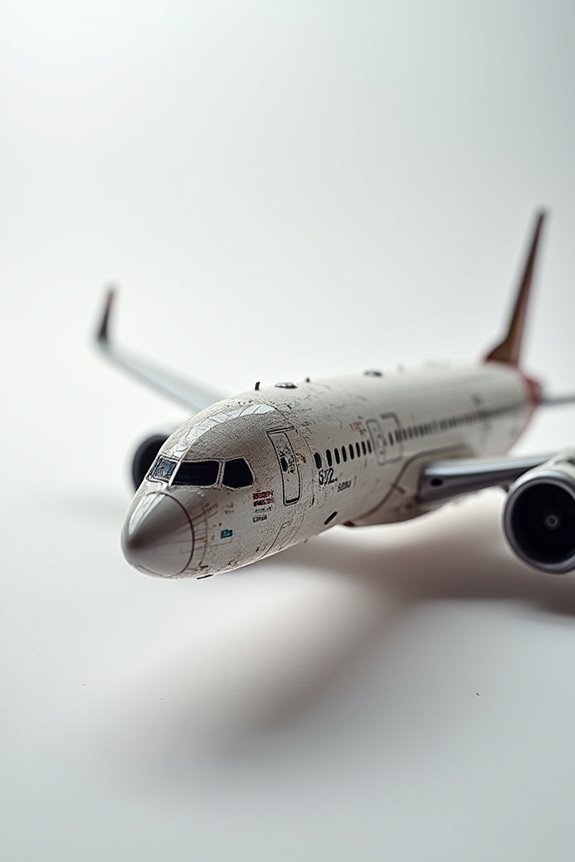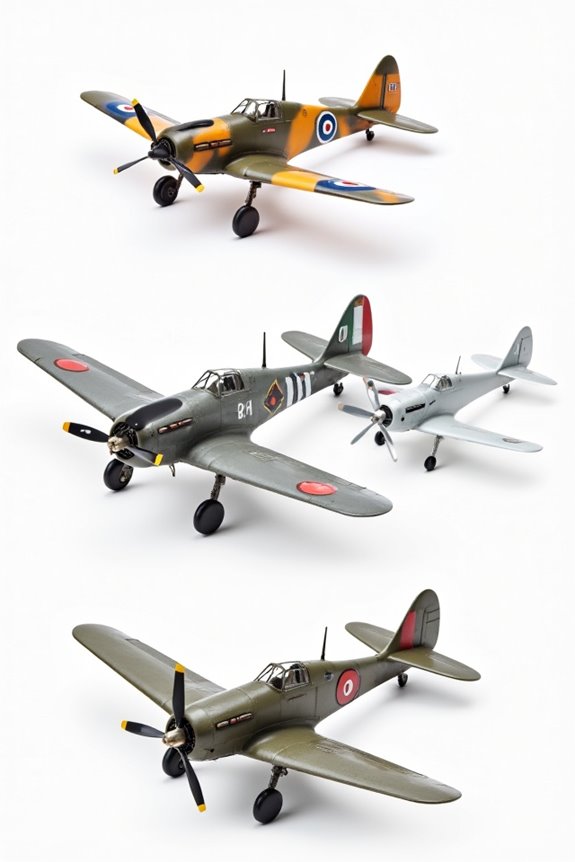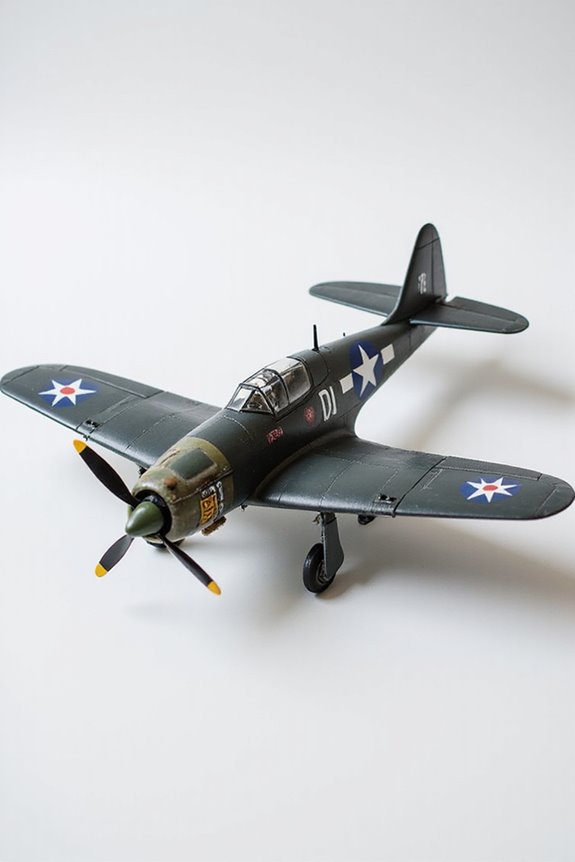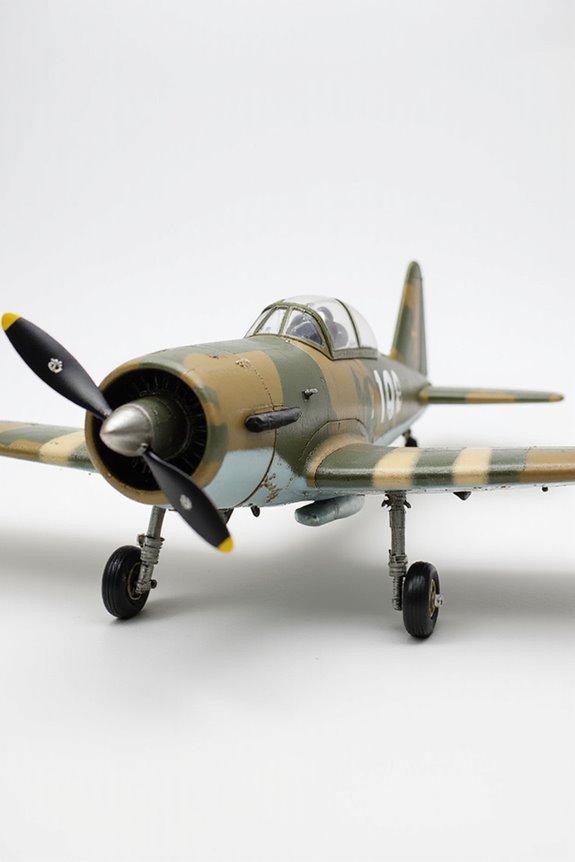As an Amazon Associate, we earn from qualifying purchases. Some links may be affiliate links at no extra cost to you. Although our opinions are based on curated research, we haven't used these products. Articles generated with AI.
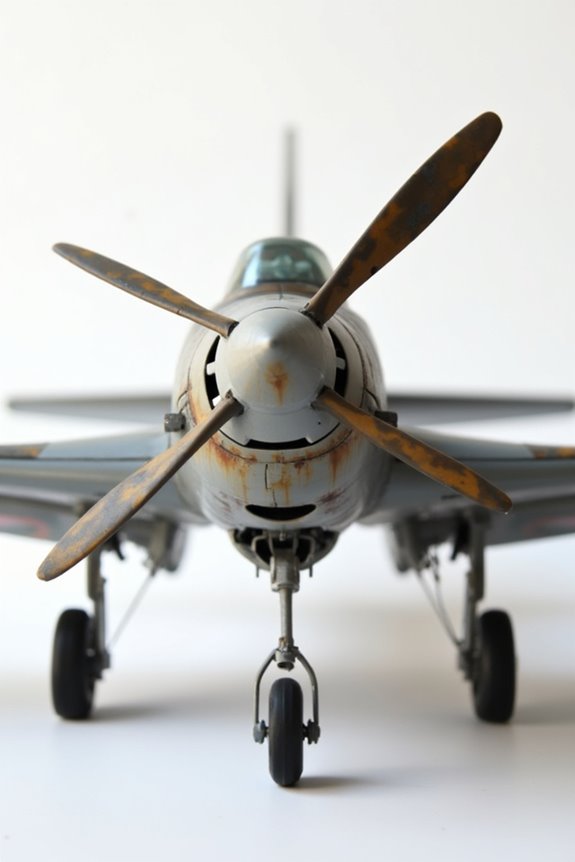
3 Best RC Plane ESCs for Optimal Performance and Efficiency
If you want peak performance for your RC plane, check out the 40A Brushless ESC, the 20A RC Brushless Motor ESC, and the DYS 12A Brushless ESC. The 40A handles high RPMs like a champ, perfect for dynamic flights. The 20A is great for easy installation and has solid safety features, while the DYS 12A offers excellent power management, though it’s compact! Want to know how to pick the right one? There’s more to explore!
Key Takeaways
- The 40A Brushless ESC is ideal for high-power motors, suitable for dynamic flights with robust safety features to prevent overheating.
- The 20A ESC provides smooth operation for moderate setups, easy installation with no soldering, and multiple protections for safe flights.
- The DYS 12A Brushless ESC is compact and efficient, offering high-quality power management and compatibility with various battery types.
- Selection should match the ESC’s current rating with the motor’s maximum continuous draw for optimal performance and efficiency.
- Prioritize ESCs with thermal management capabilities and safety features to enhance reliability and reduce risk of failures during operation.
40A Brushless ESC Speed Controller for RC Drones and Airplanes
40A Brushless ESC 2-4S Speed Controller 5V 3A BEC with XT60 Plug for RC Drone Airplanes Multi-axis...
- Output Capacity: Continuous Current 40A, Short-Time Current 55A
- BEC Output: 5V@3A (Linear Regulator Mode - Linear Mode) ; Power Input: 2-4 Lithium Batteries(Not Included)
- Maximum Speed: 210,000 RPM For 2-Pole Motor, 7000 RPM For 6-Pole Motor, 35,000 RPM For 12-Pole Motor
If you’re diving into the exhilarating world of RC drones and airplanes, the 40A Brushless ESC Speed Controller is like finding the perfect co-pilot. Weighing in at just 34g, it packs a punch with a continuous current of 40A and maxing out at 55A. That means it can handle a good bit of power without breaking a sweat.
Compatible with 2-4S lithium batteries, this speed controller can reach impressive RPMs, making your flights dynamic. Just remember, it has safety features to prevent overheating and protects against throttle loss. So, even if you push it, your motor won’t be doing the cha-cha without your say-so!
Best For: Hobbyists looking for an affordable and efficient speed controller for their entry-level RC drone and airplane projects.
Pros:
- Slim profile and lightweight design, making it ideal for various RC setups.
- Good performance with different configurations, including 50mm EDF and 4S batteries.
- Full safety features, including low pressure cut-off and throttle signal loss protection, to enhance user safety.
Cons:
- Potential for overheating on 4S setups, leading to performance issues.
- Some users have experienced programming difficulties and throttle cuts above 50%.
- Reports of BEC output exceeding 7V and internal short circuit, raising safety concerns.
20A 2-4S RC Brushless Motor ESC for RC Plane Airplane with SBEC 5V/6V 4A
TOYTENSI 20A 2–4S RC Brushless Motor ESC for RC Plane & Airplane with 5V/6V 4A SBEC
- High-Performance 32-Bit Processor: Built with a fast-response 32-bit microprocessor to deliver smooth and accurate throttle control, compatible with most sensorless...
- High-Power Switching SBEC: Integrated switch-mode BEC provides selectable 5V or 6V output up to 4A, supplying stable power for receivers and multiple servos without an...
- Pre-Installed Connectors, No Soldering Required: Comes with pre-installed XT60 battery connector and 3.5mm gold-plated motor connectors, allowing quick and safe...
Looking for a reliable ESC that packs a punch? Check out the 20A 2-4S RC Brushless Motor ESC. It’s like the Swiss Army knife for your RC plane—versatile yet powerful! With its high-performance 32-bit microprocessor, you’ll experience smooth operation and quick response times.
Don’t sweat the details; this ESC comes with a pre-installed XT60 connector, making battery hookups a breeze. Plus, it’s got a robust switch mode BEC delivering 5V/6V at 4A. Need protection? It’s got you covered with features like over-heat, low-voltage, and lost-signal protections. Now, let’s get flying!
Best For: Hobbyists and enthusiasts looking for a versatile and reliable ESC for their RC planes.
Pros:
- High-performance 32-bit microprocessor for smooth operation and quick response times.
- Easy installation with pre-installed XT60 connector and no soldering required for motor connections.
- Multiple protection mechanisms to ensure safe operation, including over-heat and low-voltage protections.
Cons:
- Limited to 20A, which may not be sufficient for more powerful setups.
- Compatibility may vary with some less common brushless motors.
- Programmability requires additional LCD Program Box or compatible transmitter for configuration.
DYS 12A Brushless ESC for RC Aircraft
DYS 12A 2-4S Brushless ESC with 5V/2A BEC with XT30 & 2.0mm Plug for RC Fixed-Wing Aircraft...
- Model: DYS 12A ESC
- Comes Pre-soldered with XT30 Connector and 2.0mm bullet plugs
- 5V/2A BEC (Very Efficient) - ESC can power receiver and servos
The DYS 12A Brushless ESC is the perfect choice for hobbyists seeking reliability and performance without breaking the bank. With its compact size, weighing in at just 1.28 ounces, it’s a lightweight champion! This ESC handles continuous current of 12A and peaks at 15A—plenty of power for most mainstream brushless motors.
It supports 2-4 LiPo batteries and guarantees your system runs smoothly with a 5V/2A BEC output. The built-in electronic governor and power management module help maintain efficiency while preventing overheating. Just be cautious; high-power motors can be a wild ride! Enjoy peak performance with the DYS 12A!
Best For: The DYS 12A Brushless ESC is best for RC hobbyists looking for an affordable and reliable speed controller for their brushless motors.
Pros:
- Compact and lightweight design, making it easy to install in various aircraft.
- High-quality power management and electronic governor enhance efficiency and performance.
- Supports a range of battery types, providing versatility for different setups.
Cons:
- Some users report throttle control issues which may affect performance.
- Occasional overheating reported under heavy use, necessitating careful monitoring.
- Limited customer feedback may leave potential buyers uncertain about long-term reliability.
Factors to Consider When Choosing an Rc Plane Esc
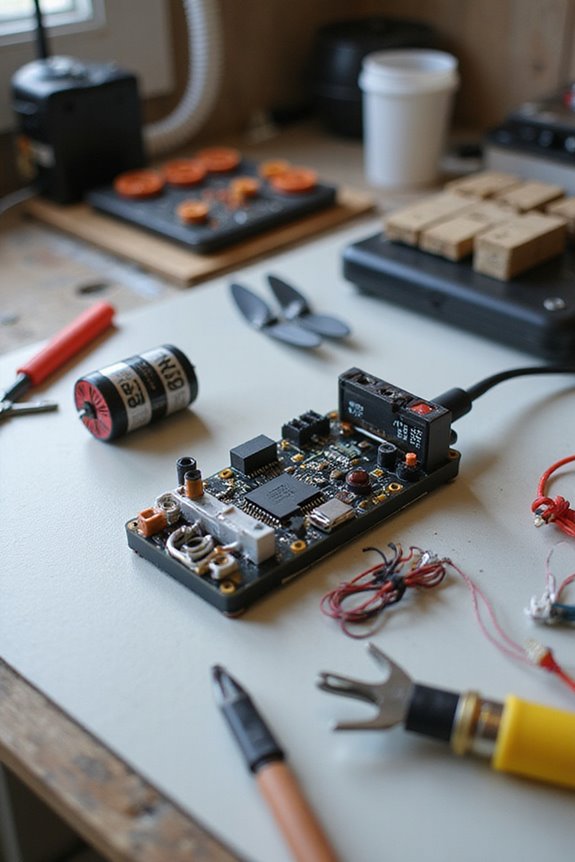
When picking an RC plane ESC, you’ve got to think about several key factors. Current rating, voltage compatibility, size, and weight are all essential to ensuring your plane flies without a hitch. And let’s not forget about protection features and programming options—because who doesn’t love a little flexibility with their tech?
Current Rating Requirements
Choosing the right current rating for your RC plane’s ESC is essential, especially if you don’t want your setup to melt under pressure. Make sure your ESC matches or exceeds your brushless motor‘s maximum continuous current draw. For instance, a 40A ESC can handle motors that draw up to 40A continuously, while a 20A ESC is for lower-powered models.
Don’t forget peak current ratings! They’re vital for those bursts of high power during thrilling maneuvers. Also, consider the BEC’s draw if it powers servos or receivers. Finally, your battery configuration (2-4S Lithium) impacts everything, including current needs. Pick wisely to keep your plane soaring, not sputtering!
Voltage Compatibility
Getting your RC plane’s ESC voltage compatibility right is essential for a smooth flight experience. You’ll want to make sure your ESC matches the battery voltage, usually ranging from 2S to 4S lithium batteries. For instance, a 4S battery has a nominal voltage of 14.8V and a fully charged voltage of up to 16.8V—yikes!
Choosing an ESC that meets or exceeds your battery’s specifications means more power and efficiency, which we all love. Don’t forget about the BEC output voltage—5V or 6V is common and needs to align with your receiver and servos. Finally, check the ESC’s continuous and peak current ratings to avoid any meltdown drama. Keep it compatible, and your plane will soar smoothly!
Size and Weight
Even if you’re excited about powering your RC plane, the size and weight of the ESC can make or break your flight experience. You want an ESC that fits snugly without cramping other components. Picture it like fitting in for a family photo—everyone’s got to have their space!
Weight’s just as important. A lighter ESC boosts performance, especially in those tiny models where each gram can matter. But don’t be fooled into thinking bigger is better; larger ESCs can offer higher current ratings but might weigh your plane down. Plus, compact designs can restrict airflow, leading to overheating—nobody likes a hot head! Always check the weight-to-thrust ratio to keep your flight smooth and fun.
Protection Features
When you’re picking out an ESC for your RC plane, don’t overlook the protection features—these little lifesavers can make all the difference. Look for low-voltage protection; it’ll save you from a dead battery mid-flight, extending your battery’s lifespan. Overheat protection is also essential—think of it as your ESC’s personal air conditioner during those hot maneuvers.
Lost-signal protection is a must; it acts like a safety net, preventing wild movements when your transmitter forgets to chat. Power-on protection? That’s your ESC’s way of saying, “Let’s not startle the neighbors!” Finally, a stable BEC output guarantees your servos and receiver get reliable power, keeping everything running smoothly. Choose wisely, and your flights will thank you!
Programming Options
Choosing the right programming options for your RC plane’s ESC is essential because you want it to perform just the way you like. Many ESCs let you customize settings via your transmitter or an LCD Program Box, giving you the flexibility to meet different flight needs. Think of this as tailoring a suit for your plane!
High-performance models may adjust throttle response, brake settings, and timing, optimizing based on your motor’s characteristics. Some also offer multiple BEC output settings, so you can power your receivers and servos like a boss!
And let’s not forget about safety—many ESCs include protection features. This means less worrying and more flying! Upgradable firmware keeps you compatible with the latest tech. Isn’t that handy?
Connector Types
You’ve got your ESC programmed and ready to go, but have you thought about the connectors? Choosing the right type is essential for performance. The most common ones are XT60 and XT30. XT60 suits higher current needs, while XT30 works for lighter setups.
Make sure your ESC’s connector matches your battery. This avoids the hassle of soldering or using adapters—nobody’s got time for that! Pre-installed connectors, like 3.5mm gold connectors, make installation a breeze. Also, pay attention to wire gauge; thicker wires handle more current. Just remember, longer wires can lead to voltage drops, which is like a buffet line that slows everything down. Some ESCs come with soldered connectors, ensuring better reliability and fewer connection issues. Happy flying!
Thermal Management
Effective thermal management is a game-changer for RC plane ESCs, especially when you push them to their limits. High loads can lead to overheating, causing component failure or even a fiery farewell to your prized model. You need to keep an eye on the ESC’s continuous current rating, like 40A or 20A, to guarantee it runs cool under pressure.
Look for features like overheat protection and low-pressure cut-off. These can save your ESC from a hot mess! Materials matter too; high-performance MOS technology helps with heat dissipation. And don’t forget about regular temperature checks during flight. They’re like checking the oven while baking—essential to avoid burnt results! So, stay cool and keep flying smoothly!
Frequently Asked Questions
What Is the Lifespan of a Typical RC Plane ESC?
The lifespan of a typical RC plane ESC usually ranges from 300 to 500 flight hours. If you’re flying it hard, expect it to wear out faster, like a pair of sneakers on a gym floor. Factors like temperature, load, and usage frequency all play a role. Keep your connections clean and cool, and you might just extend that life a bit more. Just think of it as giving your ESC a spa day!
Can I Use One ESC for Multiple Airplanes?
You can definitely kill two birds with one stone by using one ESC for multiple airplanes, but it’s not always a smooth ride. Make sure the ESC’s amp rating matches or exceeds what each plane’s motor draws. Just switch connections, but remember that different setups may need unique throttle calibrations. If you’re constantly switching, keep the specs handy. It’s like borrowing a friend’s car—you’ve got to adapt but can still enjoy the drive!
How Do I Determine the Right ESC Amperage?
To determine the right ESC amperage, start by checking your motor’s specifications. You’ll want the ESC to handle at least 10-20% more current than your motor’s max draw. For example, if your motor pulls 30 amps, aim for an ESC that can handle 33-36 amps. Think of it like using a power strip; you don’t want to overload it and cause a delicious fireworks show! So, get that matched perfectly for a smooth flight.
Are All ESCS Compatible With Brushless Motors?
Not all ESCs are created equal, just like not all pizza toppings belong on a classic pie! To work with brushless motors, your ESC needs to be designed specifically for them. Look for an ESC labeled as brushless; it’ll usually say something like “brushless” right on the packaging. Check that it matches your motor’s specifications too—voltage and current ratings matter! Using mismatched components? It’s like trying to drive a car with bicycle tires!
What Maintenance Is Required for RC Plane ESCS?
You’ll want to keep your RC plane ESCs in top shape! Regularly check for loose connections and signs of wear. Clean the connectors gently to prevent corrosion—think of it like brushing your teeth but for electronics. Also, make sure the firmware’s up-to-date if you’ve got a programmable ESC. Finally, give it a good visual inspection for any physical damage. Treat it right, and it’ll keep your flights smooth and sweet!



